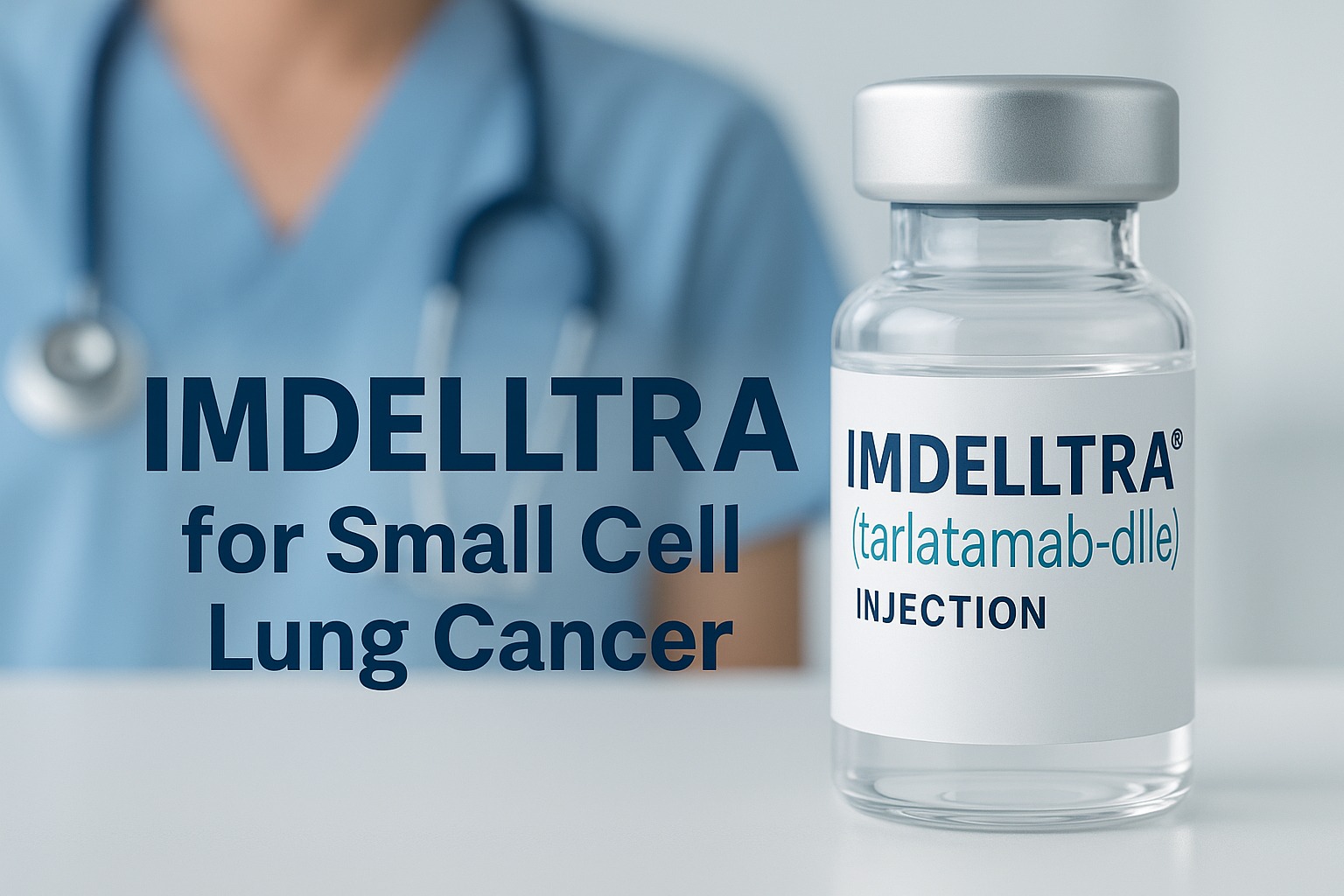Imdelltra (tarlatamab-dlle) is a prescription medicine used to treat adults with small cell lung cancer (SCLC) that has returned or worsened after at least two prior types of treatment. It belongs to a new class of medicines called bispecific antibodies, which are designed to help the body’s own immune system fight cancer.
In this easy-to-read guide, you’ll learn what Imdelltra is, how it works, when doctors prescribe it, how it’s given, possible side effects, precautions, and answers to some of the most common questions people search online.
Quick disclaimer: This article is for educational purposes only and not a substitute for professional medical advice. Always follow your doctor’s instructions.
What is Imdelltra?
Imdelltra (tarlatamab-dlle) is an immunotherapy drug that helps the body attack cancer cells. It works by connecting T-cells (a type of white blood cell) to cancer cells that carry a protein called DLL3. This action helps the immune system recognize and destroy cancer cells.
Doctors prescribe Imdelltra for:
- Adults with small cell lung cancer (SCLC)
- Patients whose cancer has returned or progressed after at least two other lines of therapy
Warnings
Imdelltra can cause serious side effects, and close monitoring is required during treatment.
- Cytokine Release Syndrome (CRS): This immune reaction can cause fever, chills, low blood pressure, and difficulty breathing. Hospital monitoring may be needed when starting therapy.
- Neurologic problems: Some patients may experience confusion, dizziness, tremors, or seizures.
- Infections: Imdelltra may increase the risk of infections. Report any fever, cough, or signs of infection right away.
- Patients are usually observed after infusions for possible severe reactions.
Before taking Imdelltra
Tell your doctor if you have:
- A history of nervous system problems or seizures
- Existing infections
- Breathing problems or lung conditions
Also, let your doctor know if you are:
- Pregnant or planning pregnancy – Imdelltra may harm an unborn baby. Effective contraception is required during treatment and for several months after the last dose.
- Breastfeeding – It is not recommended while on Imdelltra.
How is Imdelltra given?
- Imdelltra is not a pill—it is given as an intravenous (IV) infusion by a healthcare provider.
- Treatment usually begins with smaller “step-up” doses to reduce the risk of CRS, followed by higher maintenance doses.
- Infusions are given in a clinic or hospital where you can be closely monitored.
- Your doctor will decide how long you should continue treatment based on your response and tolerance.
What happens if I miss a dose?
Call your healthcare provider right away if you miss an appointment for an infusion. They will reschedule your treatment as soon as possible.
What happens if I overdose?
Since Imdelltra is given by trained professionals in a medical setting, the chance of overdose is extremely low.
What should I avoid while receiving Imdelltra?
- Avoid driving or operating heavy machinery until you know how the treatment affects you, especially if you experience dizziness, confusion, or fatigue.
- Avoid live vaccines during treatment.
What are the side effects of Imdelltra?
Serious side effects (seek medical help immediately):
- Cytokine Release Syndrome (CRS): fever, chills, dizziness, low blood pressure, breathing problems
- Neurological problems: confusion, difficulty speaking, tremors, seizures
- Severe infections: persistent cough, chest pain, shortness of breath, fever
Common side effects include:
- Tiredness (fatigue)
- Decreased appetite
- Fever or chills
- Low blood pressure
- Nausea or vomiting
- Constipation or diarrhea
This is not a complete list. Always report unusual or severe symptoms to your doctor.
Storage
Imdelltra is stored and handled only by healthcare professionals. Patients do not keep this medication at home.
Popular FAQ
1. Is Imdelltra chemotherapy?
No. Imdelltra is an immunotherapy that uses your body’s immune system to target and fight cancer cells.
2. How long will I need Imdelltra treatment?
Treatment continues as long as it is effective and side effects are manageable. Your doctor will monitor your progress regularly.
3. Does Imdelltra cure small cell lung cancer?
Imdelltra is not considered a cure, but it may help control the cancer, shrink tumors, and improve survival in certain patients.
4. Why is hospital monitoring required?
Because of the risk of severe immune reactions like CRS and neurologic side effects, patients need close monitoring during the first treatments.
5. Can Imdelltra be used for other cancers?
Currently, it is FDA-approved for small cell lung cancer only. Research is ongoing for other potential uses.
Final Thoughts
Imdelltra (tarlatamab-dlle) is a groundbreaking treatment for people with relapsed or treatment-resistant small cell lung cancer. By harnessing the immune system to target DLL3-positive cancer cells, it offers hope to patients with limited options.
If you or a loved one is prescribed Imdelltra, follow your doctor’s guidance carefully, keep all infusion appointments, and report any unusual side effects immediately. With careful monitoring and medical supervision, Imdelltra can be an important tool in managing small cell lung cancer.


I’d forever want to be update on new content on this website , saved to favorites! .